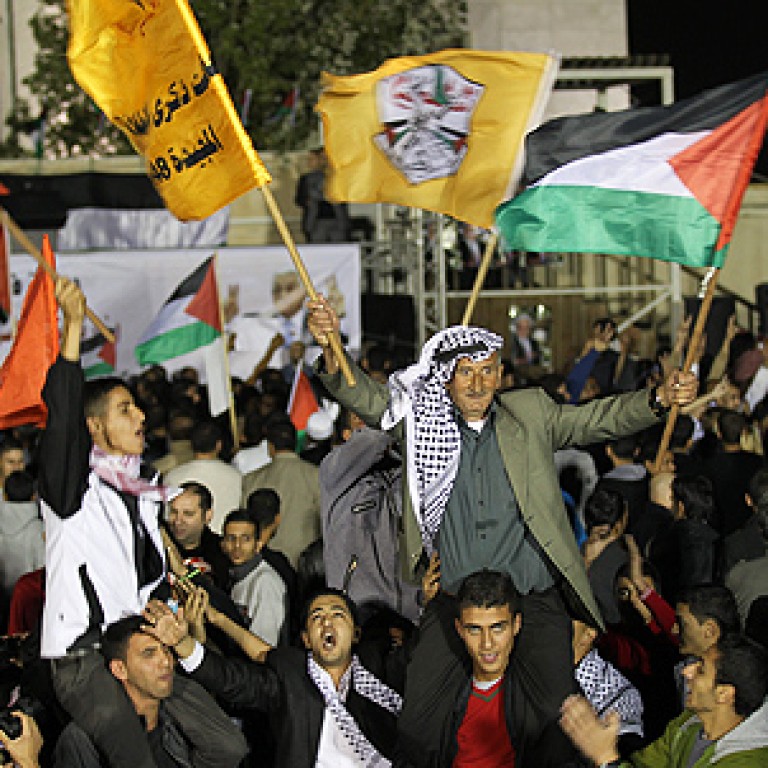
Israel frees 26 Palestinian prisoners, despite divisions
Israel freed 26 Palestinian prisoners on Wednesday, the second stage of a limited amnesty designed to help US-sponsored peace talks that have been dogged by divisions on both sides.
The inmates, convicted of murder in the killing of Israelis before or just after interim accords were signed two decades ago, were taken from jail by bus at midnight to welcoming parties in the occupied West Bank and the Gaza Strip.
Though thousands of Palestinians remain in Israeli custody, the releases could help the credibility of Palestinian President Mahmoud Abbas’s engagement with the Jewish state, which is scorned by armed Islamist Hamas rivals who govern Gaza.
Negotiations between Abbas’s administration and Israel resumed in Washington in July after a three-year halt. Held in secret, they have done little to reassure Palestinians who worry about Jewish settlement of the West Bank or Israelis who doubt Abbas could hold Hamas to any future peace agreement.
“As one who spent most of his adult life fighting Palestinian terror, in Israel and abroad, this is no easy event for me,”
Yet neither side in the talks wants to disappoint an Obama administration which has ranked reconciling them as a top Middle East policy goal. Another is curbing Iran’s disputed nuclear programme, in which Israel sees a mortal menace.
“As one who spent most of his adult life fighting Palestinian terror, in Israel and abroad, this is no easy event for me,” Israeli Defence Minister Moshe Yaalon said in a speech on Tuesday, referring to the prisoner release.
He said that Israel “has been confronted with sensitive diplomatic circumstances and weighty strategic considerations in recent months, which require that we take difficult and painful steps. This is not a black-and-white situation.”
In all, 104 long-serving inmates will go free. A first group of 26 were let out in August as part of understandings reached during shuttle diplomacy by US Secretary of State John Kerry, who set a nine-month framework for the negotiations.

Hundreds of prisoners’ relatives and well-wishers gathered at Abbas’s office in the West Bank city of Ramallah to receive 21 of the released men with pre-dawn celebrations. “Our heroes are coming home, long live the prisoners,” they chanted.
The other five ex-prisoners went to Gaza, where similar festivities were prepared just over the border from Israel.
The Palestinian Cabinet issued a statement describing the releases as a precursor to a full eventual prisoner amnesty and statehood in the West Bank, including adjacent East Jerusalem, and Gaza. Palestinians, it said, would reject any attempt by Israel to “trade” prisoners for continued settlement-building.
Yet Abbas peace envoy Saeb Erekat said the Palestinians had shelved applications to UN institutions open to them since the international forum implicitly recognised their statehood claim last year. Those institutions include the International Criminal Court, where Palestinians might have sued Israel over the settlements, considered illegal by most world powers.
“A heavy price was paid, but a self-respecting country would go through war to return these symbols of Palestine, some of whom have spent 19, even as many as 30 years in prison,” Erekat told Palestine TV.
Wednesday’s release opened fissures in Israeli Prime Minister Benjamin Netanyahu’s rightist government. A pro-settler coalition partner, the Jewish Home party, openly backed calls by Israelis bereaved or wounded in Palestinian attacks to cancel the amnesty. An appeal against it lodged with Israel’s Supreme Court was overruled on Tuesday evening, however.
“The release of terrorists in return for [Israeli chief negotiator] Tzipi Livni’s dubious right to meet Erekat is very grave,” said Jewish Home, which opposes Palestinian statehood.
In an apparent bid to appease Jewish Home and hardliners within Netanyahu’s own Likud party, government officials said new housing projects would be announced soon in West Bank settlement blocs that Israel plans to keep in any future peace deal.
